At Home in the Dark Read online
Page 23
Go on, she thought. You can’t stay here and wait for whatever’s coming.
She tucked the Glock in her waistband, sat on the edge of the opening, swung her legs in, felt for the rungs with her feet. She let herself down slowly. Five rungs. Six. Her feet touched concrete.
To the front was a bay door, a single window set high in its center letting in streetlight. On the other side of the lift pit, an open doorway led to an office.
She circled the pit, staying out of the light. Inside the office was a battered metal desk and filing cabinet. The cabinet’s drawers were open and empty. The desktop was filmed with dust. On the floor was an auto parts calendar from 2015.
She took out the Glock, held it at her side. A wide-gridded riot gate covered the front window, faint streetlight coming through. To the right of it was a glass door in a recessed doorway, with cardboard taped over a missing panel. From here, she had a clear view of the street in both directions. There was only one pole light working on the block, maybe twenty feet to her left. Beyond that, across the intersection, was the bright storefront. The cab was still there.
Headlights from the right. She stepped away from the door, back into the shadows, watched a dark Navigator approach and slow.
She took steady breaths. Don’t panic, she thought. Watch. Wait.
Another pair of lights came from the opposite direction. It was a low-slung two-door Acura. The vehicles stopped abreast of each other, window to window, the drivers talking. The car drove off.
The Navigator crossed the intersection, pulled up behind the taxi. Three men she hadn’t seen before got out and went inside the restaurant. After a few minutes they emerged, and got back in the Navigator. She watched it pull away.
They might be doing circles, grids, looking for her. The Acura too. One or more of them might be coming back this way before long. It was time to move.
With her left hand, she unlocked the door. It had swollen in its frame, wouldn’t open. She pulled hard, shook it. It rattled and creaked as it came free. Cool night air flowed in. She put the Glock in her pocket, kept her hand on it.
Outside, she cut left up the sidewalk, walking fast, but not running. She crossed the street, stayed close to the storefronts on the other side. Ahead, the yellow light blinked, lit the blacktop.
On the other side of the intersection, she stopped short of the restaurant, looked through a side window. It was bright and stark inside. Plastic tables and chairs, a counter window with thick bulletproof glass. Behind it, a young black man in a white t-shirt and apron was texting on a phone, thumbs busy.
A single table was occupied. A thin, dark-skinned man with glasses and graying hair was reading a newspaper.
She tried the rear door of the cab, wanting to get in, out of sight. It was locked. She went up to the window near where the man sat, tapped a knuckle on the glass. The second time she did it, he looked up from his paper. The counter man had put down his phone, was watching her.
She pointed at the cab. The thin man nodded briskly, took off his glasses and stowed them in a jacket pocket. He got up, left the newspaper on the table.
She waited beside the taxi, looking in both directions. No headlights, no police cruisers, no sirens.
The thin man came outside. “Miss, may I help you?”
He had an accent she couldn’t place, West Africa or somewhere in the Caribbean.
“I need a ride,” she said. “To somewhere not far from here.”
He looked around, then back at her. “Are you alone?”
“Yes.” Her breathing grew faster. She wanted to get in the cab, off the street.
“Where are you coming from?” he said.
“Queens. My car broke down. Can we go?”
With her left hand, she worked loose a bill from the pack. Her other hand stayed on the gun.
She folded the bill, held it out. It was a hundred.
“Just a few blocks,” she said. “But we need to leave now.”
He looked in the direction the Navigator had gone, then at her, the hand still in her pocket.
“Now,” she said. “Let’s go. Please.“
He took out keys, hit the remote button, unlocked the cab. The headlights blipped.
“Of course,” he said. “Anywhere you want.”
• • •
She watched the signs on the deserted streets they passed, giving him directions through the grid in the Plexiglass divider. When they came to a block that looked familiar, she said, “Slow down.”
She recognized the neighborhood now. Warehouses, muffler shops and garages. Ahead was the side street where they’d left the Volvo. A dark White Castle on the corner had been their landmark.
“Turn left up there,” she said.
From a wide alley on the right, an SUV charged out, blocked the street. The Navigator. The taxi driver braked hard, sounded the horn, stopped when he saw the men spilling out of the Navigator into the cab’s headlights.
She threw herself across the back seat, clawed at the passenger door handle, just as the first shots came through the cab’s windshield. She got the door open, tumbled out onto the ground. The cab was still rolling. It thumped solidly into the side of the Navigator.
She pulled out the Glock, brought it up. Three men were still shooting into the cab, glass and upholstery exploding. They’d hadn’t seen her get out.
She stood, took one of them down with a center-mass chest shot, swung her muzzle toward the next one, fired and missed. The round blew out a side window in the Navigator. The two men dropped down behind the cover of the cab.
Farther down the street behind her, another vehicle was coming fast. The Acura. She ran into the alley the Navigator had come out of, heard the pop of guns behind her. A bullet ricocheted off the pavement to her right. She cut across the alley into a vacant lot, ran through thigh-high weeds. More shots. Something tugged at the tail of her jacket.
The Acura turned down the alley after her. There were men on foot as well, coming through the weeds. But she was away from the street lamps now, and they had no clear target. She hurdled an overturned shopping cart, and then she was back on cracked sidewalk, another empty street, this one wider. There was an elevated roadway ahead, cars speeding along it, a dark underpass below. She heard the men behind her, didn’t look back.
She crossed the street, ran for the shadows of the underpass, cars humming above. The Acura turned left, caught her in its headlights. She made the underpass, lungs burning, came out on the other side. There on the right was a lot full of tractor trailers, surrounded by a high fence topped with razor wire. Parked in front of the closed gate, facing away from her, was a police cruiser.
She stumbled onto the weedy shoulder at the fence’s far corner, about thirty feet behind the cruiser. She couldn’t breathe. To her right, a dirt access road ran parallel to the overpass.
The cruiser’s interior light was on. A uniformed cop sat behind the wheel, drinking from a styrofoam cup.
The Acura emerged from the underpass, the front passenger window gliding down. The car slowed and came to a stop, headlamps illuminating the cruiser. The uniform turned to look back at it. Traffic rumbled by above.
The Acura didn’t move. After a minute, the window slid closed again, and the car made a long, slow u-turn away from the cruiser. Giving up.
She raised the Glock above her head and squeezed the trigger three times. The sharp cracks split the night. The Acura’s tires squealed as it pulled away fast. The cruiser’s rollers flashed into life, and the cop swung it into a hard U-turn, headed after the car, siren rising and falling.
Across the street, the lot was empty.
She sat down in the dirt of the access road, couldn’t seem to get enough air. Head between her knees, she resisted the urge to be sick. She put the Glock away, felt the right side of her jacket, the rent where a bullet had passed through the material without touching her. Pure luck, she thought. The only reason you’re alive.
From the access road, an embankmen
t led up to the overpass. She started up it, heard another siren. A second cruiser sped past below, lights rolling, following the first. Backup.
Once on the elevated roadway, there was a shoulder wide enough to walk on. A car flew past, so close she felt its slipstream. Another slowed, beeped its horn, came abreast of her. She put a hand on the Glock in her pocket. A man yelled something at her from the passenger side window, then the car sped up and passed her.
She walked on. There was a major intersection ahead, where the highway dropped down to cross another main road. On one side of the road was a dark strip mall. On the other, a three-story building with a bright lobby, and a sign above it that read PARKWAY MOTOR INN.
She let two cars pass, then sprinted across the road toward the motel. The parking lot was less than half full. She stopped to get her breath back, brushed grit and dirt from her clothes as best she could.
She gripped the big silver handle of the glass door, pulled. It wouldn’t open. Inside the lobby, a turbaned clerk stood behind thick glass at the front desk. He frowned at her.
Wearily, she took out the hundred she’d offered the cab driver, unfolded it and pressed it against the glass. She held it there, waited. The door buzzed.
She opened it and went in. She was done running.
• • •
The clerk took the two hundreds she gave him without a word, offered no change and asked for no ID. A key card attached to a diamond-shaped piece of green plastic came back in the pass-through slot. Room 110.
The lobby smelled of stale cigarette smoke and disinfectant. There was a skinny ATM near the front desk counter, a couple of worn chairs, and planters full of dusty plastic flowers.
She went down the orange-carpeted hallway. An ice machine rattled in an alcove at the end of the corridor. She heard grunting from behind a door she passed.
The room was as she’d expected. Mirror on the ceiling over the bed. Dresser and night stand, a single chair, and no windows. White shag carpet, and a TV bolted to a brace on the wall. The cigarette smell was strong in here as well.
A door led to an adjoining room. The connecting door was locked. She put an ear to it. No sound inside. She closed her door again, bolted it.
The bathroom was small, the sink mineral-stained. She realized then how thirsty she was, ran water, cupped some and drank, then spit it out. It tasted of metal.
The chair went against the hall door, the top rail wedged under the knob. It would give her warning at least, if the clerk or someone else with a key tried to come in. Then she took the Glock into the bathroom, set it on the toilet tank, undressed and showered, let the spray wash the last bits of safety glass from her hair, the tension from her shoulders. She would be sore and aching tomorrow.
When she was done, she dried off with a towel that smelled like burnt hair, dressed again. She checked the doors a final time, then sat on the edge of the bed. She thought about the cab driver. He was dead, almost certainly, and for no other reason than he had tried to help her.
She stretched out atop the comforter, not trusting the sheets, looked at her watch. Three a.m. Only three hours since they’d gone in the back door of the stash house. You’re alive, she thought, and a lot of people aren’t.
She needed sleep. Tomorrow she’d get a cab to take her into Manhattan. From Penn Station, she’d catch a train south to New Jersey and home. It wouldn’t be safe to go back for the money tomorrow. They’d still be looking for her. She’d have to wait, return another time, hope it was still there when she did.
She moved the Glock to the bed, in easy reach. She was too tired to turn out the lights, too tired to do anything. She looked up at her reflection, and closed her eyes.
• • •
She woke in silence, not sure why, raised her watch. Four-thirty.
Muscles stiff, she slid off the bed, picked up the Glock, went to the hall door and listened. Outside, the hum of the ice machine. Then, from the direction of the lobby, the quiet voices of men, too low for her to make out the words. After a moment, she realized they were speaking Spanish. Her stomach tightened.
She slipped on the jacket and gloves, pocketed the Glock, got out her knife. She went to the adjoining door. Still no sound from the other side. She worked the blade into the jamb of the inner door, pried at the deadbolt. The wood there was soft. The door opened easily.
This room was the mirror image of hers. She went in, closed both connecting doors behind her. On the far side of the room was another door. She used the knife again. The next room had the same setup, but this time no connecting door. It was the last room in the hall.
She closed the knife, went to the hall door, looked through the spyhole, got a distorted, fisheye view of the hallway, the vending alcove with the ice machine. Next to it a stairwell door.
She took out the Glock, held her breath. The voices down the hall had quieted. Easing the door open, she looked back toward 110. Three Dominicans stood outside the door. One of them held a gun to the back of the turbaned clerk’s head. The clerk slid a keycard into the reader, and when the door unlocked, they tried to push him inside, met the resistance of the chair. One of them hit the door with his shoulder, knocked it open. She heard the chair fall. They shoved the clerk inside, crowded in behind him. The third man stayed in the hall.
“Hey,” she said, and raised the Glock.
He turned toward her, gun coming up, and she fired, hit him in the shoulder. It spun him around and dropped him. She ran to the fire door, slammed her hip into the panic bar, found herself in a dim concrete stairwell. To the left, stairs ran up. Straight ahead, another fire door, this one leading outside, with a sign that read EMERGENCY EXIT ONLY! ALARM WILL SOUND!
Shots from down the hall. A round hit the door frame behind her. She kicked the bar with the sole of her foot, jolted it open. An alarm began to bleat loudly. Outside was the rear parking lot. The way they’d expect her to go.
She took the stairs two at a time. At the third landing was a shorter flight that led to the roof. The alarm kept on, echoed through the stairwell.
Another door, another panic bar. Then she was out on a blacktop roof. She could see the lights of the highway, the overpass. Far to the west, the glow of Manhattan.
In the front lot, three dark SUVs were idling near the entrance, headlights on. One of them was the Navigator. She could see the missing window, the collision damage. Another car pulled into the lot behind them. The Acura.
People were stumbling out of the lobby doors into the lot now, some half dressed, unsure what to do, where to go. There were sirens in the distance.
From the side of the roof, a fire escape ran down, its last level a hinged ladder. Flashing lights came down the highway and across the overpass, a fire engine and a police cruiser. They pulled into the lot.
She put away the Glock, swung out onto the fire escape, went down quickly. On the bottom rungs, her weight carried the hinged section down. She dropped the last couple feet to the pavement, landed wrong. Her ankle twisted under her, and she fell hard. A surge of pain ran up her leg.
Now the night was filled with sirens, people shouting, and the steady blare of the fire alarm. She got to her feet, braced herself against the wall, tested the ankle. It hurt, but would bear her weight. She limped to the front corner of the building. Two fire trucks in the lot now, another cruiser. Red and blue lights bathed the vehicles, the people milling around.
The Acura and two of the SUVs were blocked in by the trucks. The third one, a dark Chevy Tahoe, was about fifteen feet from her, parked away from the others, engine running. The passenger door was ajar, the seat there empty. She could see the man at the wheel.
Pain flashing in her foot, she limped across the distance. When she reached the Tahoe, she pulled the door wider, pointed the Glock inside. The driver turned, saw the gun. Before he could react, she swung up and into the seat, pulled the door shut behind her. “Drive.”
It was one of the men from the stash house, who’d fired at them as they ran in the
alley. He was younger than the others, with long hair slicked back. When he didn’t respond, she aimed the gun at his groin. “Your call.”
The interior of the Tahoe was washed in emergency lights, red, blue, and red again.
“You gonna pull that trigger?” he said, “All these cops around? I don’t think so.”
“I’m betting in all this confusion, no one notices. You want to find out?”
An automatic was wedged between the driver’s seat and the console, a 9 mm Steyr. She pulled it out, put it in her left coat pocket.
“You the one we been chasing, eh?” he said. “Didn’t think it would be a woman.”
She cocked the Glock’s hammer for effect. “Go.”
He looked at her, then reversed, swung the Tahoe around clear of the emergency vehicles, pointed it out of the lot. Through the motel doors, she could see the lobby was full of firefighters and cops. There were horns blowing as people were trying to leave, their cars blocked in.
The Tahoe bumped onto the highway, turned right. Another cruiser, lights and siren going, passed them from the opposite direction, turned into the lot.
“Where?” he said. Staying cool.
“Just drive.”
She tried to calm herself, figure out her next move. They were headed east, deeper into Brooklyn, the streets empty, the sirens fading behind them. Ahead on the right was the empty lot of a darkened pancake house.
She pointed. “Pull over in there.”
He slowed, glided into the lot.
“Kill the lights,” she said. “And get out.”
He turned off the headlights, looked at her. “You the one got the money?”
She didn’t answer.
“If you didn’t, you know where it is, right?”
“Why?”
“Maybe I make you a deal.”
She lowered the hammer on the Glock. “Like what?”
“You take me to it. You give me half. Then I take you wherever you want to go.”

 The Fireman
The Fireman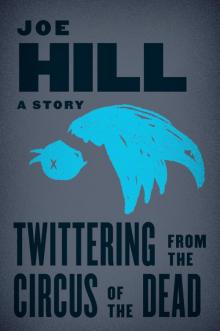 Twittering From the Circus of the Dead
Twittering From the Circus of the Dead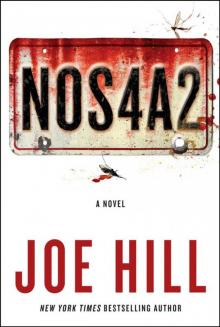 Nos4a2
Nos4a2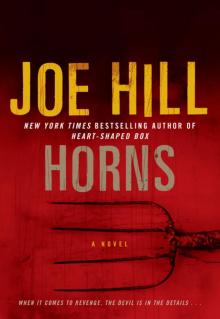 Horns
Horns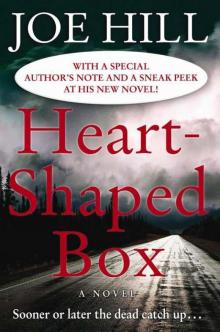 Heart-Shaped Box
Heart-Shaped Box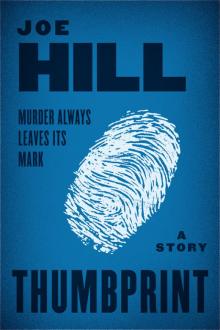 Thumbprint: A Story
Thumbprint: A Story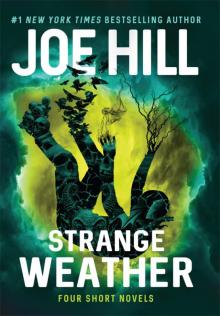 Strange Weather
Strange Weather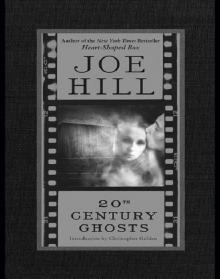 20th Century Ghosts
20th Century Ghosts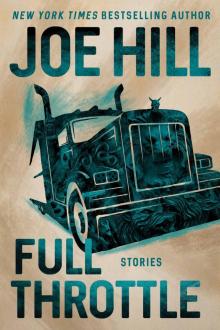 Full Throttle
Full Throttle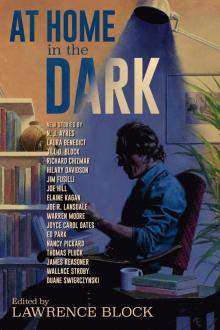 At Home in the Dark
At Home in the Dark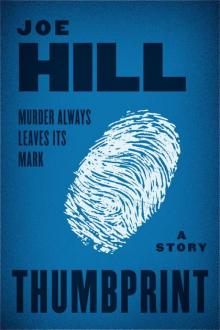 Thumbprint
Thumbprint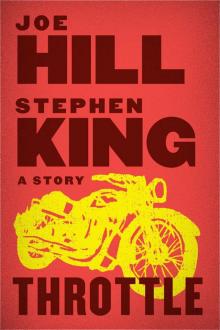 Throttle
Throttle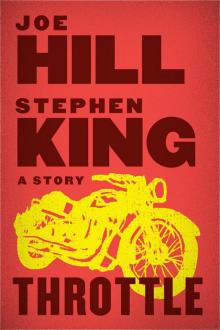 Throttle (Kindle Single)
Throttle (Kindle Single)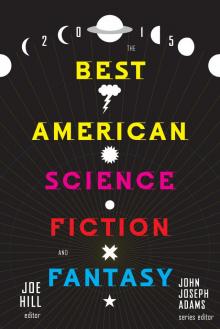 The Best American Science Fiction and Fantasy 2015
The Best American Science Fiction and Fantasy 2015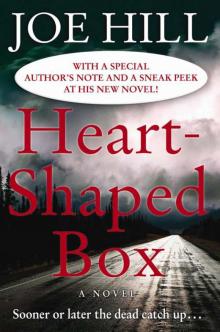 Heart-Shaped Box with Bonus Material
Heart-Shaped Box with Bonus Material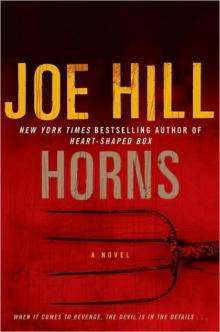 Horns: A Novel
Horns: A Novel